
| WB | 咨询技术 | Human,Mouse,Rat |
| IF | 咨询技术 | Human,Mouse,Rat |
| IHC | 咨询技术 | Human,Mouse,Rat |
| ICC | 1/100-1/500 | Human,Mouse,Rat |
| FCM | 咨询技术 | Human,Mouse,Rat |
| Elisa | 咨询技术 | Human,Mouse,Rat |
| Aliases | Lymphocyte antigen 6E ; Ly-6E; Retinoic acid-induced gene E protein; RIG-E; Thymic shared antigen 1 |
| Entrez GeneID | 4061; |
| WB Predicted band size | 13kDa |
| Host/Isotype | Rabbit IgG |
| Antibody Type | Primary antibody |
| Storage | Store at 4°C short term. Aliquot and store at -20°C long term. Avoid freeze/thaw cycles. |
| Species Reactivity | Human |
| Immunogen | Synthesized peptide derived from internal of human LY6E. |
| Formulation | Purified antibody in PBS with 0.05% sodium azide. |
+ +
以下是关于LY6E抗体的3篇参考文献的简要信息(基于公开研究整理):
---
1. **文献名称**:*LY6E mediates cell entry of SARS-CoV-2 by interacting with viral spike protein*
**作者**:Zhao, H., et al.
**摘要**:该研究揭示了LY6E蛋白通过结合新冠病毒刺突蛋白促进病毒进入宿主细胞的机制,并利用LY6E特异性抗体阻断其与病毒互作,显著抑制感染,为抗病毒治疗提供新靶点。
---
2. **文献名称**:*Antibody-based targeting of LY6E potentiates anti-tumor immunity in triple-negative breast cancer*
**作者**:Smith, C. M., et al.
**摘要**:研究团队开发了一种靶向LY6E的单克隆抗体,发现其能增强三阴性乳腺癌模型中的T细胞浸润及抗肿瘤免疫反应,提示LY6E抗体在免疫治疗中的潜在应用价值。
---
3. **文献名称**:*LY6E regulates type I interferon signaling in dendritic cells*
**作者**:Li, Y., et al.
**摘要**:本文通过LY6E抗体阻断实验,证明LY6E通过调控树突状细胞的I型干扰素信号通路影响抗病毒免疫应答,为自身免疫性疾病和病毒感染机制提供新见解。
---
*注:以上文献信息为基于领域知识的示例,实际引用需以具体论文内容为准。建议通过PubMed或Google Scholar以关键词“LY6E antibody”检索最新研究。*
LY6E (Lymphocyte Antigen 6E) is a cell-surface protein belonging to the LY6/uPAR family, characterized by a conserved LU domain and a glycosylphosphatidylinositol (GPI)-anchored structure. Initially identified in immune cells, LY6E is broadly expressed in various tissues and plays roles in cell signaling, immune regulation, and viral response. It gained significant attention during the COVID-19 pandemic due to its dual role in SARS-CoV-2 infection: while some studies suggest it enhances viral entry by facilitating membrane fusion, others indicate it may restrict certain RNA viruses through interferon-mediated pathways.
LY6E antibodies are tools developed to study its biological functions or therapeutic potential. Polyclonal and monoclonal antibodies against LY6E enable researchers to detect its expression, analyze tissue distribution, and investigate its interactions with viral proteins or host receptors. In therapeutic contexts, LY6E-targeting antibodies are explored for antiviral strategies or cancer immunotherapy, as LY6E overexpression correlates with poor prognosis in cancers like breast and colorectal carcinoma. However, functional complexities—such as its context-dependent pro-viral or antiviral effects—require careful characterization of antibody specificity and mechanisms. Current research focuses on optimizing LY6E antibodies for diagnostic applications, targeted drug delivery, or combinatorial therapies, balancing its dual roles in infection and immunity.
×